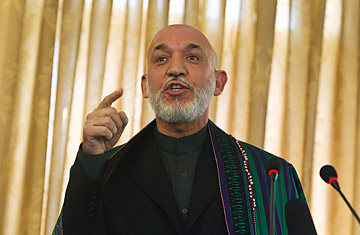
Afghan President Hamid Karzai speaks during a news conference in Kabul, Afghanistan.
Last weekend, when Afghan President Hamid Karzai called for reduced military operations and an outright end to night raids by U.S.-led forces, he made one person particularly unhappy. The remarks came just days ahead of a major NATO summit on the future of Afghanistan — and tore straight into the heart of the counter-insurgency strategy pursued by Gen. David Petraeus, commander of coalition forces. Petraeus had understood that the strategy had Karzai's support.
In the immediate aftermath of Karzai's interview with the Washington Post, a scheduled meeting between the Afghan president and the American general was reportedly canceled. Speaking pointedly to another Afghan official in lieu of Karzai, Petraeus also painted a hypothetical scenario of rapidly deteriorating security were such coalition operations to end. Two days after the brush-up, Karzai's office offered a bit of diplomacy, saying the president had confidence in the general and that his interview remarks were a positive sign of a "maturing partnership" in which both sides are increasingly able and willing to speak freely.
So what's happening? Western observers are putting it down to more political kabuki by Karzai to keep himself from looking too much like a pawn of foreign backers. Petraeus' role in the theatrics goes back to late June when the general arrived to replace Stanley McChrystal, who was relieved of duty for saying impolitic things about the Obama Administration to a journalist. Petraeus took command as the security situation remained dismal, a major campaign was taking shape in Kandahar, and deadlines loomed for troop withdrawals and a Pentagon assessment of progress in the fight against the Taliban. According to a senior U.S. officer in Afghanistan, Petraeus has pushed back against the deadlines and is pressing for an extended timetable to achieve results — one that Karzai has accepted in private but defied in public "to play to the gallery." Says the American officer: "It makes sense that [Karzai] would do this now, because in the end, he's gonna have to make nice and go along with us at Lisbon."
Lisbon is where military and civilian officials involved in the Afghanistan conflict will have a pow-wow beginning Nov. 19. It is also where Petraeus is set to announce that a complete withdrawal of combat forces will happen by the end of 2014. A phased transition will begin sometime in the spring but will be contingent on the capacity of Afghan security forces, which are lagging behind in terms of training and preparedness. According to a high-level U.S. officer in Afghanistan with knowledge of the plans, the summer 2011 deadline issued by President Obama to begin a drawdown will not be overstated in the final statement of the conference, nor will next month's White House review of Afghan operations.
Will Petraeus' formal announcement of a "transition" to Afghan control, though staggered, placate President Karzai? To help boost his public standing in the coming months, they say Karzai will announce areas where the handover to Afghan forces is to take place. Some of the first are expected in the country's northwest, where security is relatively better, though not yet to be taken for granted.
But diplomats aren't holding their breath that Karzai will stick to the coalition script in the future. He has been an increasingly problematic ally. Over the summer, he ordered the release of an aide charged with soliciting a bribe; he also placed checks on a U.S.-backed anti-corruption group. This coincided with a banking scandal that implicated some members of his cabinet. Then, in the fall, he followed up by decreeing an end to private security firms operating in Afghanistan, insisting that Afghan security forces are fully equipped to do the job instead. After development organizations complained — noting that billions of dollars worth of reconstruction projects would be in jeopardy — Karzai delayed imposing the new decree.
